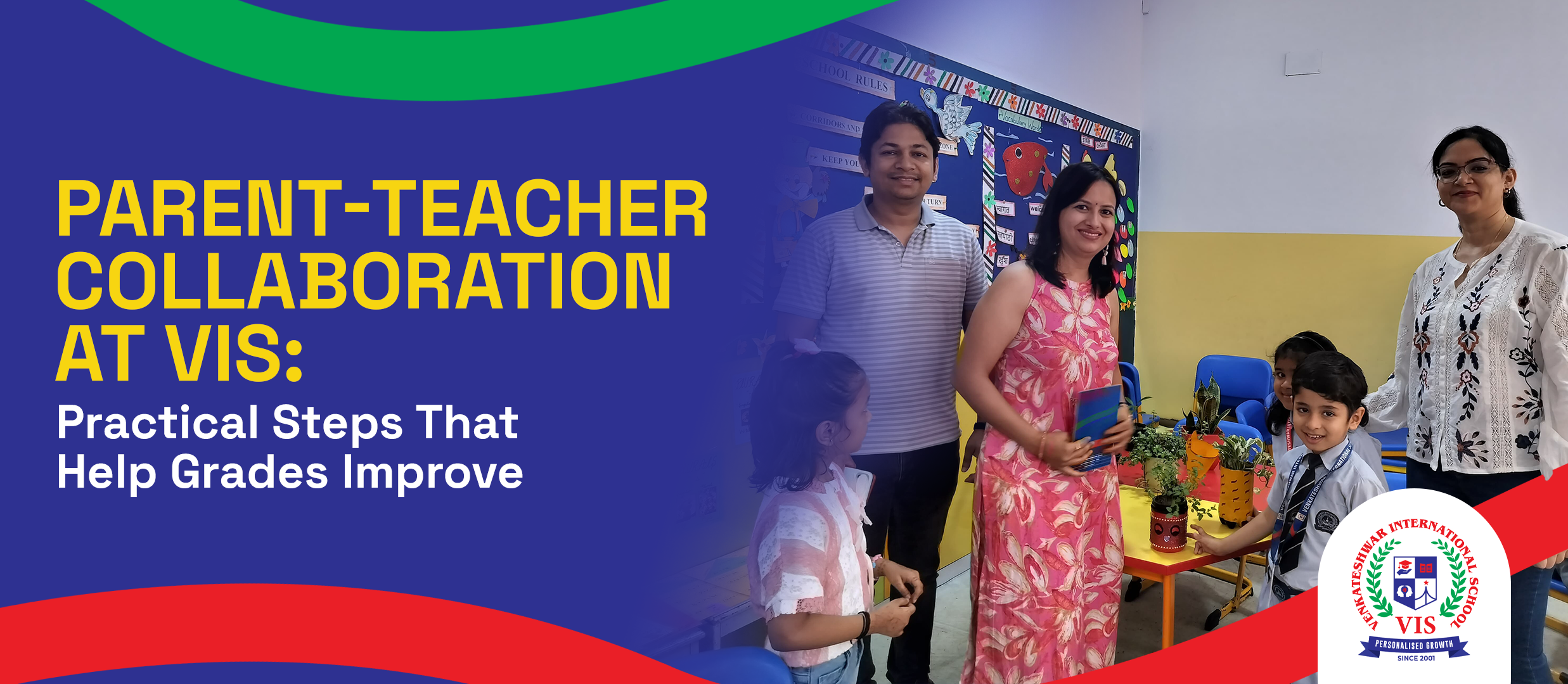Parent-Teacher Collaboration at VIS: Practical Steps That Help Grades Improve
Oct 08, 2025
Learn about VIS parent-teacher collaboration, best practices for PTMs, and how parents can support students in achieving stronger grades and becoming confident learners.

Visualise a relay race: each runner must hand off the baton with precision for the team to achieve victory!
That's how parent-teacher collaboration works at VIS. When teachers and parents work together, students are the ones who benefit. They see improved grades, higher confidence, and learning feels like teamwork rather than a solo endeavour.
The Importance of Collaboration at VIS
At Venkateshwar International School, we believe that learning goes beyond the four walls of the classroom.
Our educational staff focuses on not only academic learning, but also emotional and social learning. The knowledge and awareness of parents towards this practice and their engagement from home is vital for students to understand they are being supported academically, socially and emotionally.
Communication constantly happening between home and school helps everyone to identify gaps in learning and establishes security for children.
Best Practices for PTMs
Visiting Parent-Teacher meetings is more than a date blocked on your calendar. Parent-Teacher meetings are an ongoing conversation with your child’s teacher to understand what collaboratively needs to be provided for their development and personalised learning.
Here are the best PTM practices that families can put into action to make the most of all Parent-Teacher meetings:
- Be Prepared: Read over the recent reports that your child has finished and write down any questions. This will help keep the meeting focused, as opposed to the virtual updates, which focus on completions without being in a fruitful discussion.
- Make it Two-Way: Tell the teachers about what you are observing at home (study habits, struggles, new interests, etc) so that the teachers can adjust their approach in support of your child.
- Praise, then Problem: Always celebrate what is working well in the PTM before identifying areas of difficulty. Praising the positive is important, or potentially even necessary, to keep your child motivated.
- Set Goals: Establish simple goal action points at the end of the PTM and then check in on them next time.
- Be Regular: Ensure that you attend each PTM discussion, so that teachers are regularly tracking the students' progress and are not depending solely on feedback around exam time.
How To Support Your Kids At Home
You might be wondering how, as parents, you can support your kids on a day-to-day basis. The short answer is being consistent!
- Establish a Routine: Set a usual homework period and eliminate distractions.
- Stay Engaged: Stay informed about current class content and inquire about any work or tests.
- Encourage Reflection: Ask your child each week what went well and what didn't.
- Provide Hands-on Help: Organise notes, outline a study schedule, or quiz them before tests.
- Praise Effort: Rather than only rewarding the highest grade, let your child know that you appreciate their focus, determination, and improvement as a learner. Everyone wants to feel confident as a learner!
- Communicate Early: If you observe a student changing in mood, engagement, or study habits, communicate with teachers and staff before it escalates.
The Payoff: Better Marks, Happier Students.
When parents and educators share jointly accountable roles, students receive powerful and similar messaging regarding learning and behaviour expectations.
Teachers observe and report on students' behaviours and contributions to their academic learning and success. Parents reinforce these learning competencies at home, creating a cohesive support system for students.
Over time, this partnership will manifest as improved grades and a more positive attitude toward attending school.
In Summary
An effective VIS parent-teacher relationship is not a formality; it is a partnership.
VIS is starting to share best practices for Parent-Teacher Meetings (PTM) by focusing on how parents can support students, teachers, and families in working together to create a stronger learning environment.
When home and school function as one team, every student at VIS will have the opportunity to thrive.